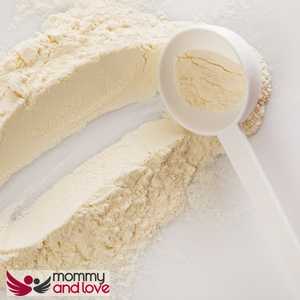Can I drink muscle milk while breastfeeding? The truth is that drinking protein shakes or taking protein powders along with breastfeeding can be a contentious topic. After all, everyone has different opinions on the matter.
Now, this isn’t a blog about dieting or exercise routine. That’s an entirely different post- and we do have lots of advice on losing weight while breastfeeding. This is merely to address the fact that women are drinking protein shakes and powering their muscles through breastfeeding.
Bear with me: that’s awesome. But, there are some questions surrounding whether or not it’s safe.
What is Muscle Milk?
Muscle Milk is a popular brand of protein powders and protein shakes. Their products contain milk protein, sodium caseinate, calcium, fructose and many others.
What is Muscle Milk Used For?
Muscle Milk products can help keep your body in a positive protein balance, which can improve muscle recovery after each exercise session, offer sustained energy, and assist in lean muscle development.
What Are Protein Powders?

Protein powders are protein supplements that come in powder form. Some of them are specifically designed for bodybuilders and other athletes to help them build muscle mass. However, protein powders can also be useful for people who want to lose weight.
There are many protein powders on the market, so it’s important to choose the best protein powder that works for you. It should be a clean protein powder and made from organic ingredients directly sourced from USDA organic certified farms.
For example, whey protein is a popular choice among bodybuilders, while casein protein is more slowly absorbed and may be better for people who want to lose weight.
What Are Protein Shakes?
Protein shakes are a popular way to increase protein intake, especially among athletes and bodybuilders. They are typically made with protein powders, which are concentrated sources of protein that can be mixed with water or milk.
Whey protein powder is one of the most common types of protein powders used in shakes, but there are also plant-based protein powder options available. There are also gluten-free, hormone-free and soy-free options for amino acids.
However, stay away from rice protein. Aside from having no nutritional value, they also contain heavy metals that are considered dangerous.
Many protein powders are made into shakes and are often consumed before or after a workout in order to help the body recover and build muscle. They can also be consumed as a meal replacement or snack.
Protein shakes typically contain fewer calories than a full meal, making them a good option for those trying to lose weight. Some of them have added digestive enzymes that are supposed to improve nutrient absorption.
However, it should be noted that many ready-to-drink protein shakes are loaded with fats and artificial sweeteners that are often considered unhealthy.
Should I Drink Protein Shakes While Breastfeeding?

It’s important to maintain optimal nutrition while breastfeeding, and protein shakes can be a helpful way to ensure you’re getting enough of the essential amino acids your body needs.
However, it’s also important to make sure you’re following a healthy diet overall.
A protein shake that contains whey protein powder can be a convenient way to get some of the nutrients you need while breastfeeding, but they’re not necessary for everyone. Some of them contain digestive enzymes that can interfere with digestion and potentially give people food allergies.
Additionally, breastfeeding mothers with health conditions such as high blood pressure should talk to a registered dietitian or lactation consultant about whether drinking protein shakes while breastfeeding is right for them before taking drinking Muscle Milk or any other type of protein supplement.
How to Make Sure You Have Enough Protein in Your Diet While Breastfeeding?
Protein requirements for a breastfeeding mom are higher than those of non-breastfeeding women, but most women can meet their protein needs without having to consume additional protein. However, proper nutrition is still important, and there are some things that you can do to make sure you’re getting adequate protein in your diet while breastfeeding.
A mother’s diet directly impacts the quality and quantity of her milk supply. While it is important to eat a balanced diet while breastfeeding, it is especially important to make sure you are getting enough grams of protein. Protein helps promote a healthy milk supply, so nursing mothers need about 70-80 grams of protein per day.
As a new mom, you have enough to worry about without having to stress about getting enough protein. Here are some easy ways to make sure you’re meeting your protein requirements without missing nutrients:
- Nut butter is an excellent source of protein and can be easily added to your diet. Just a couple of tablespoons each day can give you the protein you need. You can choose variants that are gluten-free.
- Add pumpkin seeds to your diet. Pumpkin seeds are a great source of plant-based protein and are also high in zinc, which is can help increase milk supply.
- Eating fresh fruit is a great way to get additional vitamins and minerals, as well as some protein. Just a couple of servings each day can help you meet your protein needs.
- Dairy foods and other whole food protein sources are another excellent source of protein. Cheese and milk are both recommended sources of protein during pregnancy and lactation.
By following these simple tips, you can make sure you’re getting enough protein while breastfeeding. So don’t stress, and enjoy this special time with your baby.
How Does Protein Affect Breast Milk?
It’s well-known that breast milk is the best source of nutrition for babies. But what many people don’t realize is that breast milk is also packed with protein. In fact, breast milk contains more than twice the amount of protein as cow’s milk.
So how does this extra protein affect breast milk? Well, it helps to boost milk production and supply. This means that mothers who consume more protein may produce more breast milk and enjoy more speedy postpartum healing. If you’d like some help increasing your supply, check out our guide on how to increase breast milk supply.
So if you’re looking to increase your breastmilk production, make sure to include plenty of protein in your diet.
Foods to Increase Breast Milk

As a lactating mother, you may be looking for foods to help increase your breast milk supply. While there are many lactation support products on the market, some mothers prefer to get their nutrients from food sources.
Here are three lactation-supporting foods to consider incorporating into your diet:
Brewer’s yeast is a type of yeast that is often used in baking. It is a rich source of B-vitamins, including vitamin B12, which is essential for lactation. Brewer’s yeast can be added to smoothies, oatmeal, or simply sprinkled on food or even in lactation cookies
Monk fruit is a type of melon that grows in Southeast Asia. It is a natural lactation booster and is rich in antioxidants. Monk fruit can be added to smoothies or yogurt, or eaten on its own as a snack.
Lactobacillus acidophilus is a type of probiotic that is found in yogurt and other fermented foods. Probiotics are beneficial for gut health and have been shown to increase milk production in lactating mothers. Incorporate yogurt into your diet or take a probiotic supplement daily.
By incorporating these foods into your diet, you will receive enough lactation support.
Protein Source Alternatives for Milk
There are many different types of milk substitutes available on the market, so it is important to do your research before choosing one.
If you are considering removing milk from your diet, there are a few things you should keep in mind.
First, milk is a good source of protein and other nutrients. If you remove milk from your diet, you will need to find another source of protein.
Milk is also a good source of calcium and vitamin D, so removing it from your diet could lead to deficiencies in these nutrients.
There are many different types of milk substitutes available, so you will need to find one that meets your needs. Some milk substitutes are made from soy, almond, or rice milk.
Choose a milk substitute that is high in protein and low in sugar. You should also make sure that the milk substitute you choose is fortified with calcium and vitamin D.
Can You Take Protein Drinks for Postpartum Weight Loss?
Yes, you can take protein drinks for postpartum weight loss. However, it is important to remember that they are not a miracle solution and should be used in conjunction with a healthy daily diet and regular exercise.
They can help you lose baby weight by providing your body with the nutrients it needs to build muscle and burn fat. They can also help you feel fuller for longer, which can reduce your overall calorie intake.
When choosing a protein drink, it is important for many women to choose one that is low in sugar and calories for their daily nutrition. You should also make sure that it contains quality ingredients and a good balance of essential nutrients.
Weight loss through regular diet and exercise is the best way to go. Make sure to include whole grains and other healthy foods in your diet as well to get extra nutrients.
Exercise is essential for weight loss, so aim for at least 30 minutes of moderate activity most days of the week. If you’re breastfeeding, you may need to wait until your baby is a little older before starting an exercise routine. Check with your doctor first to make sure it’s safe for you to start working out.
In addition to diet and exercise, there are other lifestyle changes you can make that will help with weight loss. We’ve done a guide to the Dukan diet, intermittent fasting and 1200 calories diet when breastfeeding.
Get enough sleep, manage stress, and stay away from processed foods and sugary drinks. Focus on eating these super foods after giving birth to aid your recovery. Making these changes will help you lose baby weight safely and keep it off in the long run.
Conclusion
A breastfeeding mother may drink Muscle Milk but doing so carries many potential risks and concerns. If you are looking to boost your protein intake, there are other safer and healthier alternatives.
FAQ
Can I Drink Muscle Milk While Pregnant?
It is not advised during pregnancy as there is little clinical evidence of the risks and benefits for pregnant women. If you are looking for a good protein source, you can always eat vegetables, meat and fruits.
Why Are Ready to Drink Protein Drinks Bad?
Ready-to-drink protein drinks are often loaded with artificial sweeteners, added sugar, and other artificial ingredients and lack healthy fats. This combination can lead to spikes in blood sugar and increases sugar cravings, which can be detrimental to your health.
Artificial sweeteners have also been linked to weight gain and other health issues.
They are often more expensive than making your own shake at home.

This article was written by Sandra Baker – full time writer and the mother of four amazing kids (including twins!)
She’s also a breastfeeding counselor and has spent years helping new parents learn how to care for their children. When she’s not writing or caring for her children, Sandra likes to spend time reading and taking walks with her husband.




